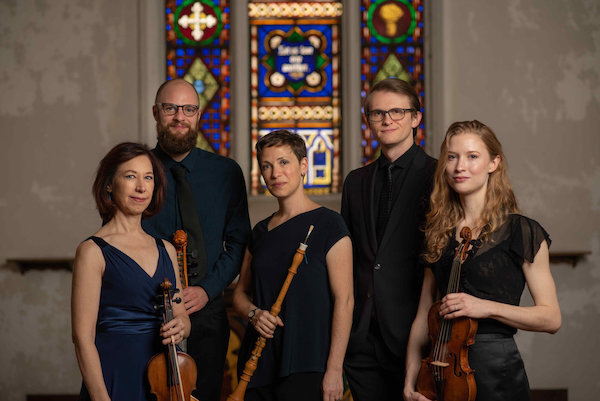Winds of change blow softly in Les Délices’ music of revolution
“Les Délices” was what Voltaire called his and his mistress’s love nest in Geneva, and the connotation of sophisticated epicurean pleasures has followed the name ever since.
Sunday afternoon at Corpus Christi Church in Morningside Heights, the adventurous early-music ensemble Les Délices added another Voltairean meaning with its program of Revolutionary Era chamber music titled “Winds of Change.”
As if that weren’t enough layers of meaning in the title, the program featured two prominent wind players, oboist and Les Délices founder Debra Nagy and a visiting artist, the star early-music flutist Emi Ferguson. Every work on the bill but one was by a composer of African ancestry—adding yet another resonance, as contemporary as right now, to the “change” of the title.
Yet for all the group’s intention to evoke world-shaking events in the late 1700s (and perhaps today), no bombs interrupted the tuneful music they performed so elegantly. There was no Beethoven shaking his fist, not even servant Figaro slyly sassing the Count. For hints of revolution, one had to look at the context.
Joseph Bologne, Chevalier de Saint-Georges, son of a Guadeloupe planter and an enslaved black woman, was a sort of one-man revolution, rising high in Paris society and the musical establishment despite his biracial heritage, by virtue of his good looks and talent for fencing as well as music. A Mason and friend of liberty, Bologne successfully navigated the Revolution, and late in life visited Haiti as rebellion was brewing there.
His ambitions lay mostly in the opera house, but he composed and published chamber music when he needed income, mostly during the 1770s. The fragrance of the ancien régime lingered around these pieces, which provided the material for two new adaptations by oboist Nagy performed on Sunday’s program, a Quartet for Flute and Strings and a Quartet for Oboe and Strings.
Blessed by a nearly Mozartean abundance of attractive ideas, these works stood well above the routine products of their era, especially as sympathetically performed by Les Délices. In the Flute Quartet (originally a sonata for flute and harp), the exceptionally creamy sound of Ferguson’s Baroque flute lifted her fellow players in graceful arcs, as she duetted with violinist Shelby Yamin, and violist Allison Monroe and cellist Rebecca Reed wove the quartet web. A genial fast Andante led to a Menuetto with two contrasting trios, and finally an elegantly tailored Rondeau with a catchy refrain.
If the printed program hadn’t said so, one would hardly have guessed that arranger Nagy had stitched the Oboe Quartet together from two of Bologne’s string quartets. Opening with an intricate and smartly executed Allegro assai in a minor key, the piece settled into a plaintive aria displaying oboist Nagy’s fine phrasing and legato, then changed to major for a witty, tuneful Rondeau.
Between these two quartets by the master from Guadeloupe, the full ensemble of strings, oboe and flute performed a new piece with more explicit Caribbean roots, A Journey to Freedom by the Haiti-born American composer Sydney Guillaume. Despite its hopeful title, this single-movement piece—a Les Délices commission—seemed to offer more questions than answers, as a melancholy theme in a rocking three-to-a-bar returned again and again amid more urgent episodes, including one lilting to a habanera rhythm. At times canons turned round and round in a seemingly endless circle, and the piece closed with Ferguson’s rich flute and Nagy’s slender oboe calling to each other across the stage in a long diminuendo. Was this the winds of change, or the soft breeze of resignation? One awaits the sequel.
Bologne’s near-exact contemporary Luigi Boccherini was a gentle soul, not to be found at any barricades, yet his innovations were many, especially when it came to sensuous textures and novel modulations. His Quintet in C major for Flute, Oboe, Violin, Viola, and Cello, G. 44, opened in an easy Allegro non troppo, with the flute, oboe, and violin taking turns with a flirty, sighing theme, before taking off on startling runs. At mid-movement, some intriguing harmonic clashes took the place of logical, Haydn-style development.
Unless the program was in error, the ensuing two movements were labeled Allegretto and Tempo di Menuetto in that order, but the one with real minuet character came first, stepping along with a pretty tune that resembled the Christmas song “In dulci jubilo.” The finale theme paused often, as no actual minuet would, and the movement unfolded as a passacaglia (variations) on a simple theme, a C major scale either rising or falling. But there was nothing simple about the chromatic harmonies Boccherini dressed the theme in, or the exuberant decorations he hung on it. Having expertly mixed the composer’s textures and colors, the ensemble closed the piece charmingly with soft bird calls between flute and oboe. If these were the sounds of revolution, let us have more of it.
Music Before 1800 presents the vocal ensemble Blue Heron performing “Petrarch’s Canzoniere in Song,” madrigals by Verdelot, Arcadelt, Willaert, de Rore, Wert, Marenzio, and others, interspersed with readings of Petrarch’s love poetry, 4 p.m. Feb. 19 at Corpus Christi Church. mb1800.com.
